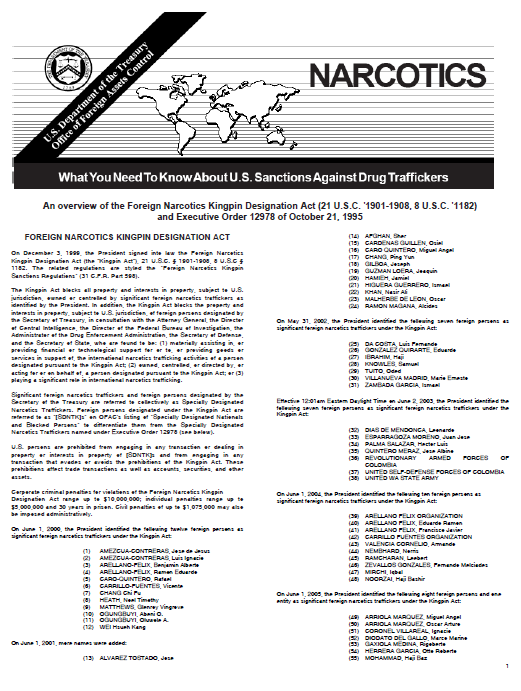 OFFICE OF FOREIGN ASSETS CONTROL
OFFICE OF FOREIGN ASSETS CONTROL
- 11 pages
- June 2010
On December 3, 1999, the President signed into law the Foreign Narcotics Kingpin Designation Act (the “Kingpin Act”), 21 U.S.C. § 1901-1908, 8 U.S.C § 1182. The related regulations are styled the “Foreign Narcotics Kingpin Sanctions Regulations” (31 C.F.R. Part 598).
The Kingpin Act blocks all property and interests in property, subject to U.S. jurisdiction, owned or controlled by significant foreign narcotics traffickers as identified by the President. In addition, the Kingpin Act blocks the property and interests in property, subject to U.S. jurisdiction, of foreign persons designated by the Secretary of Treasury, in consultation with the Attorney General, the Director of Central Intelligence, the Director of the Federal Bureau of Investigation, the Administrator of the Drug Enforcement Administration, the Secretary of Defense, and the Secretary of State, who are found to be: (1) materially assisting in, or providing financial or technological support for or to, or providing goods or services in support of, the international narcotics trafficking activities of a person designated pursuant to the Kingpin Act; (2) owned, controlled, or directed by, or acting for or on behalf of, a person designated pursuant to the Kingpin Act; or (3) playing a significant role in international narcotics trafficking.
Significant foreign narcotics traffickers and foreign persons designated by the Secretary of the Treasury are referred to collectively as Specially Designated Narcotics Traffickers. Foreign persons designated under the Kingpin Act are referred to as “[SDNTK]s” on OFAC’s listing of “Specially Designated Nationals and Blocked Persons” to differentiate them from the Specially Designated Narcotics Traffickers named under Executive Order 12978 (see below).
U.S. persons are prohibited from engaging in any transaction or dealing in property or interests in property of [SDNTK]s and from engaging in any transaction that evades or avoids the prohibitions of the Kingpin Act. These prohibitions affect trade transactions as well as accounts, securities, and other assets.
Corporate criminal penalties for violations of the Foreign Narcotics Kingpin
Designation Act range up to $10,000,000; individual penalties range up to $5,000,000 and 30 years in prison. Civil penalties of up to $1,075,000 may also be imposed administratively.
